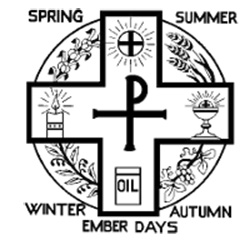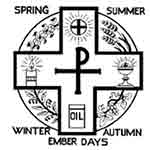
Today, Wednesday after the First Sunday in Lent, is traditionally an Ember Day – a day of special prayer and fasting.
The Episcopal Church’s Book of Common Prayer (page 18) has “The Ember Days, traditionally observed on the Wednesdays, Fridays, and Saturdays after the First Sunday in Lent, the Day of Pentecost, Holy Cross Day, and December 13”. The mnemonic is “Lenty, Penty, Crucy, Lucy”.
In ancient Italy, the times (originally three) were associated with sowing, harvest, and vintage, for which one prayed, fasted, and gave alms. Later, the one in Lent was added. We don’t know when this Lent one was added, but we know it was by the time of Gelasius I (492-496).
Recently, we brought up the discussion here.
The four Ember times became occasions for ordination, for which the Christian community prayed and the candidates prepared themselves by prayer and retreat. TEC’s BCP appoints proper collects and readings under the title “For the Ministry (Ember Days), including propers “For those to be ordained,” “For the choice of fit persons for the ministry,” and “For all Christians in their vocation” (BCP, pp. 256-257, 929).
There are discussions of connections between these Christian days and possible Jewish roots. As far as I know, there is no Eastern equivalent to the West’s Ember Days which might make a Jewish background less likely. In any case, the biblical fourfold fast, part of the ongoing consecration of the year to God, echoes in the Ember Days tradition:
Thus says the Lord of hosts: The fast of the fourth month, and the fast of the fifth, and the fast of the seventh, and the fast of the tenth, shall be seasons of joy and gladness, and cheerful festivals for the house of Judah: therefore love truth and peace. Zech 8:19
The Didache, which may predate some NT texts, indicates Palestinian Jews fasted on Monday and Thursday (their twice-a-week fasting is mentioned in the Pharisee’s boasting Lk 18:12). The Didache (Chapter 8) instructs Christians to fast, instead, on Wednesdays and Fridays. Saturday, when Christ lay in the tomb, was added by Rome as another fast day.
Augustine notes that Christians in Rome fasted on Saturday, those in Milan did not. This concerned his mother, Monica. Ambrose’s advice led to the famous saying, “When in Rome, do as the Romans do”:
When my mother followed me to Milan, she found the Church there not fasting on Saturday. She began to be troubled, and to hesitate as to what she should do; upon which I, though not taking a personal interest then in such things, applied on her behalf to Ambrose, of most blessed memory, for his advice. He answered that he could not teach me anything but what he himself practised, because if he knew any better rule, he would observe it himself. When I supposed that he intended, on the ground of his authority alone, and without supporting it by any argument, to recommend us to give up fasting on Saturday, he followed me, and said: When I visit Rome, I fast on Saturday; when I am here, I do not fast. On the same principle, do you observe the custom prevailing in whatever Church you come to, if you desire neither to give offense by your conduct, nor to find cause of offense in another’s. When I reported this to my mother, she accepted it gladly; and for myself, after frequently reconsidering his decision, I have always esteemed it as if I had received it by an oracle from heaven. (54:3)
A further investigation could look at the presence of First Testament readings in more recent pre-Vatican II lectionaries on Ember Days – a sign of the ancient nature of these days. The Ember Days preserve the weekly Christian fast days when, on other weeks, they have been abandoned. And they do so with a direct connection to nature and the seasons.
At a time when we need to urgently attend to the human connection to the natural world, underscoring the Christian connections to nature cannot be stressed enough. Ember Days are days for fasting and abstaining, in repentance, thanking God for his gifts in nature and praying that we humans use these gifts appropriately, with discipline and moderation.
Of all the Ember Days traditions, only the Pentecost one remains in NZ Anglicanism. The New Zealand Prayer Book He Karakia Mihinare o Aotearoa has two sets (page 12): “Ember Days. Prayers are offered on the weekdays following the Day of Pentecost and the week preceding St Andrew’s Day.”
If you appreciated this post, do remember to like the liturgy facebook page, use the RSS feed, and signing up for a not-very-often email, …




Thank-you Bosco, soo informative. RUTH ( a Parishioner of the Anglican Church in South Canterbury NZ)
Thanks for your encouragement, Ruth, for the time and energy I put into this. Blessings.
Wow. I had never heard of Ember days. Thanks for the well-written and engaging post!
Thanks for the encouragement, Stephen. And happy exploring – I also intend to put up a further blog post on this tomorrow. Blessings.